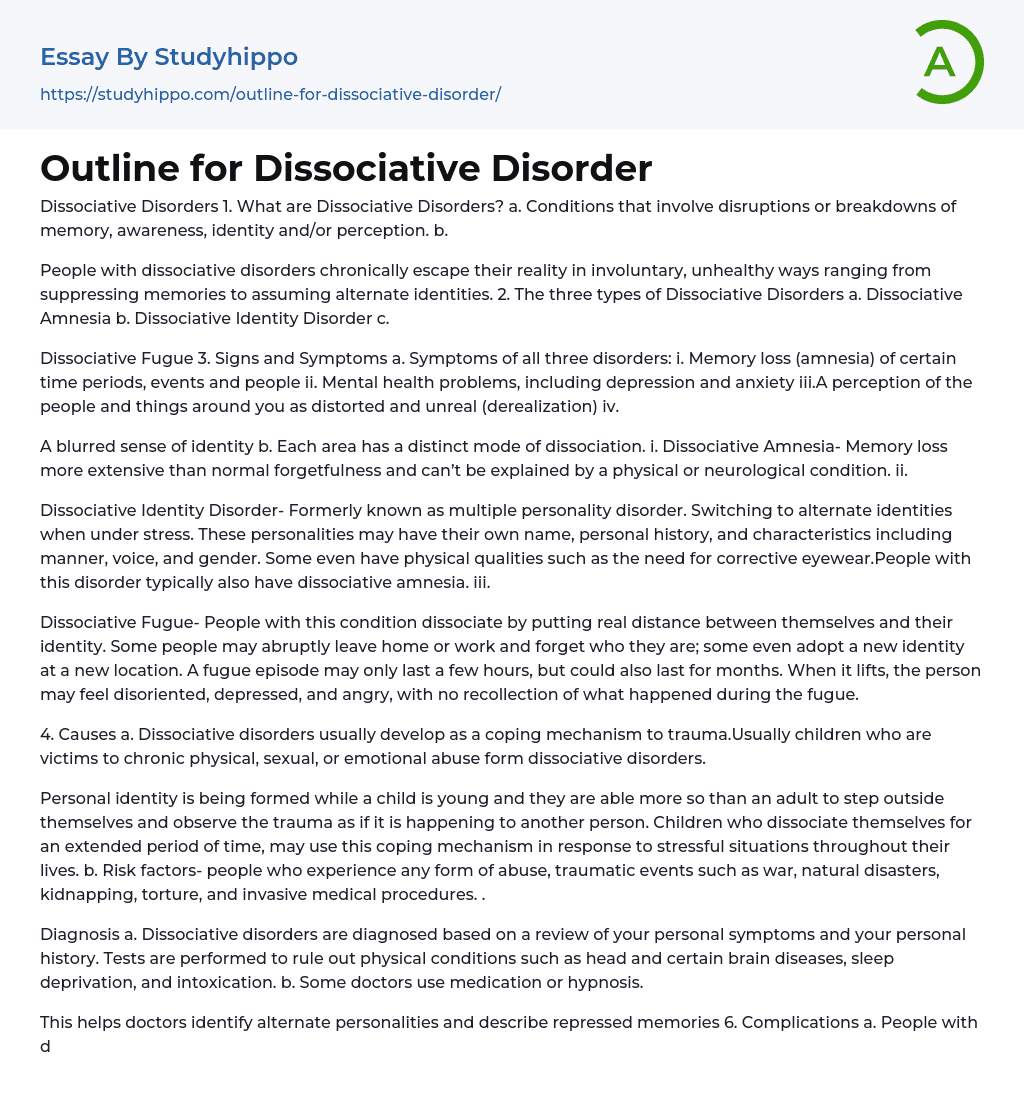Conditions that lead to disturbances or failures in memory, identity, perception, and consciousness are classified as Dissociative Disorders.
Individuals who habitually detach from reality through unhealthy methods, such as repressing memories or adopting alternate personas, may exhibit one of three types of dissociative disorders: dissociative amnesia, dissociative identity disorder and
During the third stage of dissociative fugue, people may suffer from amnesia regarding specific time periods, events and individuals. Additionally, they might encounter mental health issues like anxiety and depression. Furthermore, they could experience derealization where people and objects appear distorted or unreal. These symptoms are common to all three disorders.
Distinct types of dissociation are experienced in various areas, resulting in a vague sense of self and Dissociative Amnesia characterized by memory loss that exceeds typical forgetfulness and lacks physical or neurological explanations.
Dissociati
...ve Identity Disorder, previously called multiple personality disorder, causes individuals to switch between different identities when faced with stress. These distinct personas may exhibit unique characteristics such as behaviors and physical traits (such as gender or the need for corrective eyewear). Additionally, those affected by this condition commonly experience dissociative amnesia.
Dissociative Fugue refers to a situation where an individual physically separates themselves from their identity, resulting in abrupt departure from home or work and memory loss. This may lead to the adoption of a new persona elsewhere. The duration of such episodes can range from hours to months and often leave the person feeling disoriented, depressed and angry without any recollection of events that occurred during the fugue.
One common cause of dissociative disorders is the use of coping mechanisms to handle traumatic events, particularly among children who have endured ongoing physical, sexual or emotional abuse.
A
individuals mature, they form their unique identity and gain the capacity to separate themselves from their experiences. This separation enables them to view their traumatic encounters from an external viewpoint. However, those who tend to dissociate frequently during unpleasant childhood occurrences may continue with this coping mechanism for life. Such behavior is especially prevalent among people who have faced abuse, war or natural disasters, kidnapping or torture, or invasive medical procedures.
When diagnosing dissociative disorders, doctors usually conduct a thorough assessment of the individual's symptoms and personal history. They may also use medical tests to rule out physical conditions like neurological illnesses, intoxication, and sleep deprivation. Treatment methods vary depending on the doctor's approach, but medication or hypnosis may be used.
Healthcare professionals are able to use the provided data to recognize differing personalities and bring up repressed memories. Nevertheless, people who suffer from dissociative disorders encounter challenges such as self-inflicted harm, suicidal actions, and comparable issues.
Several types of mental health conditions exist, such as alcoholism or substance abuse, depression, sleep disorders, anxiety disorders, and eating disorders.
Psychotherapy is the primary treatment for individuals with dissociative disorders who struggle with forming connections as a result of their inability to handle emotional or occupational pressure, leading to unreliability and isolation.
One option for managing a condition is to consult with a therapist, who can provide insight into underlying causes and suggest various coping strategies. These may include hypnotherapy as a treatment approach, as well as Creative Art Therapy, Cognitive Therapy, and medication.
Professional assistance is crucial in preventing dissociative disorders in children who have undergone physical, sexual, or emotional abuse. These vulnerable individuals necessitate mental health experts' support to prevent the
development of such disorders.
9. Statistics show that providing statistical information on Dissociative Disorder is a challenge due to the fact that it is a relatively recent disorder that is frequently misdiagnosed.
According to estimates, Dissociative Fugue affects about 2 in every 1,000 individuals, while Multiple Personality Disorder affects approximately 3% of American adults. A case study involving Shirley Ardell Mason revealed that she was confined in a two-story gray bungalow.
During her youth, Mason experienced abusive behavior from her mother, who displayed overprotective tendencies such as tightly grasping her hand when crossing the street. Mason suffered from severe emotional issues, which resulted in the emergence of 16 distinct personalities. Psychiatrist Wilbur was convinced that Mason could bring forth these personalities at her own discretion, while another psychiatrist believed they only appeared after their encounter.
After being hypnotized, Mason adopted personalities that Wilbur linked to her breast cancer diagnosis. However, after she died on February 26, 1998, questions emerged regarding the authenticity of her illness and her case has been revisited.
If the corpus callosum is severed, it can cause a disruption in a person's coherence perception. This resembles the "Jekyll and Hyde" phenomenon where the brain's left and right hemispheres appear to function separately.
- Insanity essays
- John Locke essays
- 9/11 essays
- A Good Teacher essays
- A Healthy Diet essays
- A Modest Proposal essays
- A&P essays
- Academic Achievement essays
- Achievement essays
- Achieving goals essays
- Admission essays
- Advantages And Disadvantages Of Internet essays
- Alcoholic drinks essays
- Ammonia essays
- Analytical essays
- Ancient Olympic Games essays
- APA essays
- Arabian Peninsula essays
- Argument essays
- Argumentative essays
- Art essays
- Atlantic Ocean essays
- Auto-ethnography essays
- Autobiography essays
- Ballad essays
- Batman essays
- Binge Eating essays
- Black Power Movement essays
- Blogger essays
- Body Mass Index essays
- Book I Want a Wife essays
- Boycott essays
- Breastfeeding essays
- Bulimia Nervosa essays
- Business essays
- Business Process essays
- Canterbury essays
- Carbonate essays
- Catalina de Erauso essays
- Cause and Effect essays
- Cesar Chavez essays
- Character Analysis essays
- Chemical Compound essays
- Chemical Element essays
- Chemical Substance essays
- Cherokee essays
- Cherry essays
- Childhood Obesity essays
- Chlorine essays
- Classification essays




